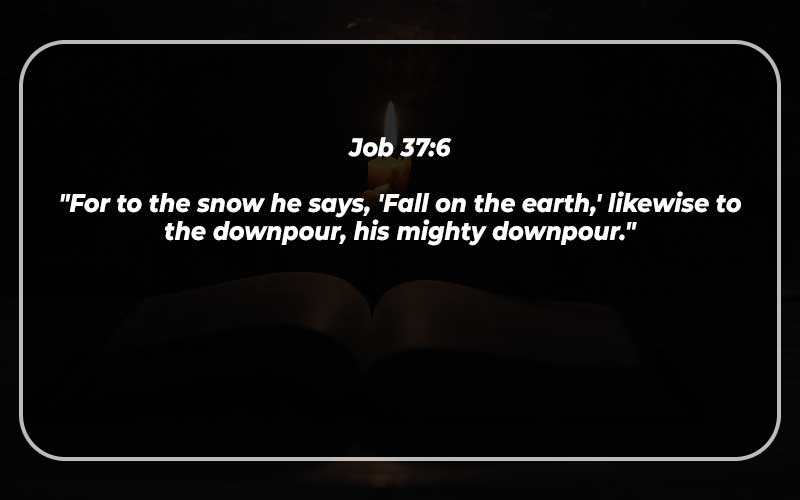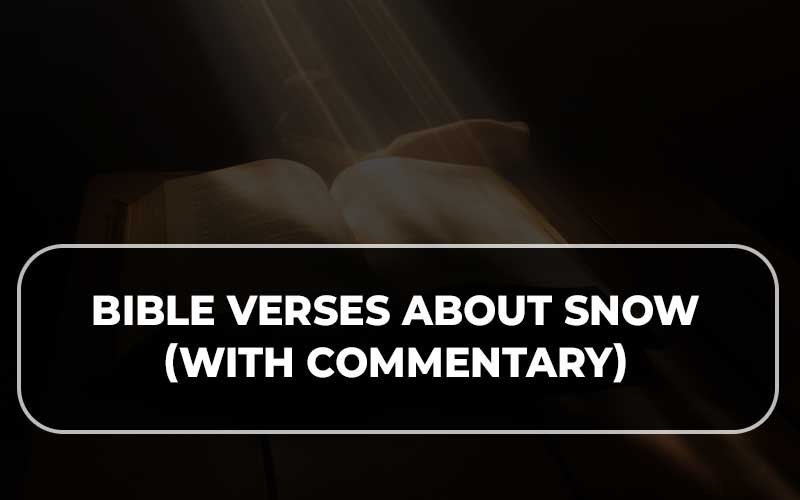The Bible often uses the imagery of snow to convey spiritual truths, highlighting its purity, transformative nature, and association with God’s sovereignty.
In this compilation, we explore 30 Bible verses about snow, accompanied by commentaries to unravel the deeper meanings and lessons embedded in this natural phenomenon.
From the pristine whiteness symbolizing purity to the transformative power of forgiveness, these verses provide insights into the richness of biblical teachings using the metaphor of snow.
Bible Verses About Snow
Job 37:6
“For to the snow he says, ‘Fall on the earth,’ likewise to the downpour, his mighty downpour.”
Commentary: This verse from Job illustrates God’s control over weather patterns, including the gentle descent of snow as part of His majestic creation.
Psalm 51:7
“Purge me with hyssop, and I shall be clean; wash me, and I shall be whiter than snow.”
Commentary: David, in his repentance, uses the metaphor of snow’s pure whiteness to express his longing for spiritual cleansing and renewal.
Proverbs 31:21-22
“She is not afraid of snow for her household, for all her household are clothed in scarlet.”
Commentary: The virtuous woman in Proverbs is prepared for all seasons, even the challenges symbolized by snow, as her household is provided for and covered in warmth.
Isaiah 1:18
“Come now, let us reason together, says the Lord: though your sins are like scarlet, they shall be as white as snow; though they are red like crimson, they shall become like wool.”
Commentary: Isaiah portrays God’s promise of forgiveness and redemption, using the imagery of sins transformed from scarlet to the pure whiteness of snow through divine grace.
Job 9:30-31
“If I wash myself with snow and cleanse my hands with lye, yet you will plunge me into a pit, and my own clothes will abhor me.”
Commentary: Job uses the metaphor of washing with snow to express futility in self-righteousness before the majesty of God.
Psalm 148:8
“Fire and hail, snow and mist, stormy wind fulfilling his word!”
Commentary: Snow, along with other natural elements, is portrayed as obedient to God’s command, highlighting His sovereign authority over creation.
Jeremiah 18:14
“Does the snow of Lebanon leave the crags of Sirion? Do the mountain waters run dry, the cold flowing streams?”
Commentary: Jeremiah employs the constancy of snow in Lebanon as a metaphor for the unchanging nature of God’s promises.
Psalm 147:16
“He gives snow like wool; he scatters frost like ashes.”
Commentary: The psalmist depicts God’s creative power in bestowing snow and frost, illustrating His ability to transform landscapes with delicate beauty.
Job 38:22-23
“Have you entered the storehouses of the snow, or have you seen the storehouses of the hail, which I have reserved for the time of trouble, for the day of battle and war?”
Commentary: God, in questioning Job, refers to the storage of snow as part of His divine plan, emphasizing its purpose in times of trouble and judgment.
Psalm 68:14
“When the Almighty scatters kings there, let snow fall on Zalmon.”
Commentary: The mention of snow falling on Zalmon is symbolic, signifying God’s triumph over enemies and the establishment of His righteous rule.
Matthew 28:3
“His appearance was like lightning, and his clothing white as snow.”
Commentary: Describing the angel at the empty tomb, Matthew employs the imagery of snow to emphasize the celestial and radiant nature of the heavenly messenger.
Daniel 7:9
“As I looked, thrones were placed, and the Ancient of Days took his seat; his clothing was white as snow, and the hair of his head like pure wool; his throne was fiery flames; its wheels were burning fire.”
Commentary: The depiction of the Ancient of Days in Daniel’s vision includes the symbolism of snow-white clothing, signifying divine purity and holiness.
Revelation 1:14
“The hairs of his head were white, like white wool, like snow. His eyes were like a flame of fire.”
Commentary: Describing the glorified Christ, the reference to white hair as snow emphasizes His wisdom, eternity, and purity.
2 Samuel 23:20
“And Benaiah the son of Jehoiada was a valiant man of Kabzeel, a doer of great deeds. He struck down two ariels of Moab. He also went down and struck down a lion in a pit on a day when snow had fallen.”
Commentary: Benaiah’s bravery in slaying a lion on a snowy day is highlighted, illustrating courage and valor in adverse conditions.
Psalm 148:3-4
“Praise him, sun and moon, praise him, all you shining stars! Praise him, you highest heavens, and you waters above the heavens!”
Commentary: Snow is mentioned in the context of praising God along with other elements of creation, showcasing the beauty of diversity in worship.
Psalm 68:14
“When the Almighty scatters kings there, let snow fall on Zalmon.”
Commentary: The mention of snow falling on Zalmon in the context of divine triumph implies a sacred and victorious act, connecting the purity of snow with the unfolding of God’s righteous purposes.
Matthew 17:2
“And he was transfigured before them, and his face shone like the sun, and his clothes became white as light.”
Commentary: The transfiguration of Jesus involves a transformation that transcends the brilliance of snow, highlighting His divine nature and the heavenly radiance that emanates from Him.
Psalm 148:7-8
“Praise the Lord from the earth, you great sea creatures and all deeps, fire and hail, snow and mist, stormy wind fulfilling his word!”
Commentary: The inclusion of snow in the psalmist’s call to praise depicts it as an element of creation participating in the fulfillment of God’s sovereign word, underscoring the interconnectedness of all created things.
Proverbs 25:13
“Like the cold of snow in the time of harvest is a faithful messenger to those who send him; he refreshes the soul of his masters.”
Commentary: This proverb utilizes the refreshing quality of snow during the harvest as a metaphor for the positive impact of a faithful messenger who brings good news and rejuvenates the spirit.

Lamentations 4:7-8
“Her princes were purer than snow, whiter than milk; their bodies were more ruddy than coral, the beauty of their form was like sapphire. Now their face is blacker than soot; they are not recognized in the streets; their skin has shriveled on their bones; it has become as dry as wood.”
Commentary: Lamentations contrasts the pristine purity of the princes with the drastic change brought about by judgment, illustrating the reversal from purity to defilement.
Matthew 24:20
“Pray that your flight may not be in winter or on a Sabbath.”
Commentary: Jesus, in speaking about the future, acknowledges the challenges of winter travel, highlighting the difficulties associated with the cold and potential hardships during that season.
Psalm 148:14
“He has raised up a horn for his people, praise for all his saints, for the people of Israel who are near to him. Praise the Lord!”
Commentary: The mention of snow in the context of praising the Lord signifies a holistic celebration, including elements of creation, as part of God’s people expressing gratitude and honor.
Habakkuk 3:3-4
“God came from Teman, and the Holy One from Mount Paran. His splendor covered the heavens, and the earth was full of his praise. Selah His brightness was like the light; rays flashed from his hand; and there he veiled his power.”
Commentary: Habakkuk uses vivid imagery, likening God’s brightness to light and describing His praise filling the earth. The mention of snow here could symbolize the purity and brilliance of God’s presence.
Psalm 147:17-18
“He hurls down his crystals of ice like crumbs; who can stand before his cold? He sends out his word, and melts them; he makes his wind blow and the waters flow.”
Commentary: The poetic imagery of God hurling down ice and then melting it with His word emphasizes His control over natural elements, including snow, and the power of His divine intervention.
Isaiah 55:10-11
“For as the rain and the snow come down from heaven and do not return there but water the earth, making it bring forth and sprout, giving seed to the sower and bread to the eater, so shall my word be that goes out from my mouth; it shall not return to me empty, but it shall accomplish that which I purpose, and shall succeed in the thing for which I sent it.”
Commentary: Isaiah uses the analogy of rain and snow nourishing the earth to illustrate the effectiveness of God’s word in accomplishing His purposes, emphasizing the life-giving and transformative nature of both.
Zechariah 14:6-7
“On that day there shall be no light, cold, or frost. And there shall be a unique day, which is known to the Lord, neither day nor night, but at evening time there shall be light.”
Commentary: Zechariah uses the absence of cold and frost as symbols of peace and a unique day marked by the Lord’s presence, portraying a supernatural environment.
James 1:6
“But let him ask in faith, with no doubting, for the one who doubts is like a wave of the sea that is driven and tossed by the wind.”
Commentary: James draws a parallel between faith and stability, contrasting it with doubt likened to a wave. The mention of wind may symbolize uncertainties, much like the unpredictability of snow.
Revelation 20:11
“Then I saw a great white throne and him who was seated on it. From his presence earth and sky fled away, and no place was found for them.”
Commentary: The image of a great white throne may allude to purity and holiness, and the fleeing of earth and sky emphasizes the transcendent nature of God’s eternal judgment.
Psalm 148:12-13
“Young men and maidens together, old men and children! Let them praise the name of the Lord, for his name alone is exalted; his majesty is above earth and heaven.”
Commentary: In the psalmist’s call to praise, the inclusion of snow in the context of diverse groups highlights the universal nature of worship, encompassing people of all ages.
Job 24:19
“Drought and heat snatch away the snow waters; so does Sheol those who have sinned.”
Commentary: The fleeting nature of snow waters being snatched away serves as a metaphor for the transience of life and the inevitability of Sheol (the realm of the dead), reinforcing the consequences of sin.

